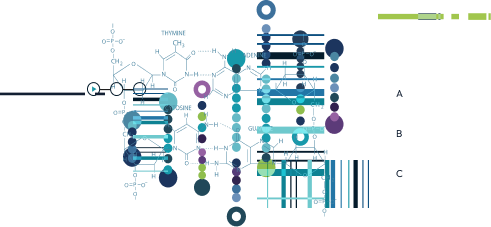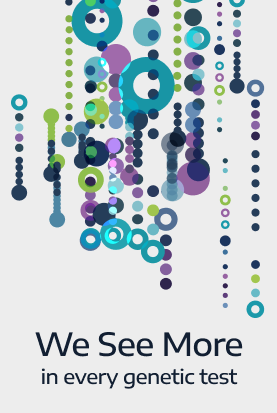List of Secondary Findings Genes

Information about optional secondary findings
ACMG SF v3.3
The American College of Medical Genetics and Genomics (ACMG) recommends reviewing and reporting pathogenic and expected pathogenic variants in a list of 84 genes.1 They have recommended this list because the genes are related to conditions that are “actionable”, meaning that there are steps that can be taken to mitigate the onset or severity of the clinical outcome.
Patients who receive comprehensive testing have the choice to opt-in to receive secondary pathogenic and likely pathogenic findings in these genes. Variants of uncertain significance (VUS) will not be reported.
The following tests have the option to opt-in to ACMG Secondary Findings:
- Genomic Unity® 2.0
- Genomic Unity® Whole Genome Analysis
- Genomic Unity® Exome Plus Analysis
- Genomic Unity® Exome Analysis
- Genomic Unity® Lightning Genome Analysis – Neonatal
- Genomic Unity® Lightning Genome Analysis – Pediatric
- Genomic Unity® Lightning Genome Analysis – Standard
- IriSight® Comprehensive Analysis – Prenatal
Genes related to cancer predisposition
| Gene | Disorder |
| APC | Familial adenomatous polyposis |
| RET | Familial medullary thyroid cancer |
| BRCA1, BRCA2, PALB2 | Hereditary breast and/or ovarian cancer |
| SDHD, SDHAF2, SDHC, SDHB, MAX, TMEM127 | Hereditary paraganglioma–pheochromocytoma syndrome |
| BMPR1A, SMAD4 | Juvenile polyposis syndrome |
| TP53 | Li–Fraumeni syndrome |
| MLH1, MSH2, MSH6, PMS2 | Lynch syndrome |
| MEN1 | Multiple endocrine neoplasia type 1 |
| MUTYH* | MUTYH-associated polyposis |
| NF2 | Neurofibromatosis type 2 |
| STK11 | Peutz–Jeghers syndrome |
| PTEN | PTEN hamartoma tumor syndrome |
| RB1 | Retinoblastoma |
| TSC1, TSC2 | Tuberous sclerosis complex |
| VHL | von Hippel–Lindau syndrome |
| WT1 | WT1-related Wilms tumor |
Genes related to cardiovascular disease predisposition
| Gene | Disorder |
| FBN1, TGFBR1, TGFBR2,SMAD3, ACTA2 , MYH11 | Aortopathies |
| PKP2, DSP, DSC2, TMEM43, DSG2 | Arrhythmogenic right ventricular cardiomyopathy |
| RYR2, CASQ2, TRDN | Catecholaminergic polymorphic ventricular tachycardia |
| BAG3, DES, RBM20, TNNC1, TNNT2, LMNA, FLNC, TTN | Dilated cardiomyopathy |
| CALM1, CALM2, CALM3 | Long QT syndrome types 14 and 16 |
| COL3A1 | Ehlers–Danlos syndrome, vascular type |
| LDLR, APOB, PCSK9 | Familial hypercholesterolemia |
| MYH7, MYBPC3, TNNI3, TPM1, MYL3, ACTC1, PRKAG2, MYL2 | Hypertrophic cardiomyopathy |
| PLN | Intrinsic cardiomyopathy |
| KCNQ1, KCNH2 | Long QT syndrome types 1 and 2 |
| SCN5A | Long QT syndrome 3; Brugada syndrome |
Genes related to inborn errors of metabolism
| Gene | Disorder |
| BTD* | Biotinidase deficiency |
| CYP27A1* | Cerebrotendinous xanthomatosis |
| GLA | Fabry disease |
| OTC | Ornithine transcarbamylase deficiency |
| GAA* | Pompe disease |
Genes related to other disease phenotype
| Gene | Disorder |
| ABCD1 | Adrenoleukodystrophy |
| HFE** | Hereditary hemochromatosis |
| ACVRL1, ENG | Hereditary hemorrhagic telangiectasia |
| RYR1, CACNA1S | Malignant hyperthermia |
| HNF1A | Maturity-onset diabetes of the young |
| RPE65* | RPE65-related retinopathy |
| ATP7B* | Wilson disease |
| TTR | Hereditary transthyretin amyloidosis |
* Will be reported only if two likely pathogenic and/or pathogenic variants are identified (homozygous or compound heterozygous state).
**HFE p.Cys282Try homozygous only.
